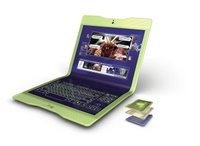One Laptop. One Child. One Revolution.
 Many people have never heard of Nicholas Negroponte. Dont confuse him with his brother John, the former ambassador to Iraq, and current Director of National Intelligence. Nicholas is the former head and founder of MIT's ground breaking Media Lab. Dr. Negroponte has been studying how computers and humans interact for the last 40 years. He was involved in the creation of WIRED magazine, wrote Being Digital, and was a key investor in Skype. Nicholas sits on the board of Ambient Devices and Motorola Corporation. All of his experience and accomplishments have lead him to a singular vision. One that when it should come to fruition stands to change the world. It is his goal to provide every child on earth, all one billion of them, with their own laptop.
Many people have never heard of Nicholas Negroponte. Dont confuse him with his brother John, the former ambassador to Iraq, and current Director of National Intelligence. Nicholas is the former head and founder of MIT's ground breaking Media Lab. Dr. Negroponte has been studying how computers and humans interact for the last 40 years. He was involved in the creation of WIRED magazine, wrote Being Digital, and was a key investor in Skype. Nicholas sits on the board of Ambient Devices and Motorola Corporation. All of his experience and accomplishments have lead him to a singular vision. One that when it should come to fruition stands to change the world. It is his goal to provide every child on earth, all one billion of them, with their own laptop.The One Laptop Per Child initiative has gone very quickly from concept to massive undertaking. Now a non profit organization that has attracted contributions and funding from such companies as Google, AMD and Red Hat. OLPC seeks to build a $100 dollar laptop, one that will then be sold to individual countries in quantities of one million units. The laptops will then be given away at no cost to the students of those nations. The machines technology is low end by current standards; 500Mhz processor, 128 megs of ram, a half a gig of flash memory to serve as a hard drive. But the one laptop per child program is not about hardware. Dr. Negroponte has said "The idea is simple. It's an education project, not a laptop project. If we can make education better--particularly primary and secondary schools--it will be a better world." And that is what this is really about. Empower the children, and you change the world.
Still there are some unique aspects of the OLPC computer that make it especially viable in the developing world. The machine is designed around low power consumption. With a dual mode display that can be switched from full color 640x480 video, to a black and white reflective daylight readable mode, the aimed for power draw is a minuscule two to three watts. To charge the machine, a manual crank or foot pedal is being integrated into the laptops power supply. Worst case scenario, pump the foot pedal for six minutes, and get an hour of usage. This is critical as many of the target areas where the laptop will first see use have no electricity to speak of. And they certainly wont have Ethernet jacks or phone lines. Which is where the Mesh Network comes in. Each machine will act as a node on a network. If any two machines are near each other, they will be instantly networked. And every computer acts as a router, connecting any neighboring system to any other neighboring system. A novelty with just a hand full of machines, but with a hundred systems, a thousand, ten thousand, you start to see the real promise of the network. And any Internet connection available to one machine will be available to all. A wireless mesh network that will span villages, and eventually nations.
The computers will run exclusively on open software. Not just free, but software that will give students and teachers the power to mod and tinker and hack new applications and solutions however they choose. Basic programing applications will also be included to introduce even the youngest students to writing software. And the machines will be localized with keyboards and interfaces in the language of whatever region they are destined for. They will also be 100% ruggedized , built of thick rubber or some similarly impossible to destroy material. Negroponte also intends the machines to be visually unique. So much so that it will be obvious at a glance that they are from the OLPC program. (although no final design has been settled on, here are a few prototypes.) This will make the machines much more difficult to move via grey markets. And eventually they will be so ubiquitous, that there will be no grey markets to speak of. The hundred dollar price tag is only an initial goal, Nicholas projects that by 2010, they will be $50 or less. A fully functional mesh networked laptop computer for the cost of a couple of text books.
Imagine for a moment, a world where all children have the same educational tool at their disposal. Where whether you are a fourth grader in an inner city school in Detroit, or a tiny village in china, you can read hundreds of books, use any software, or reach out to the billion other students around you. A planet where every child regardless of economic or social standings, will be able to participate in their own education in ways no one ever has before. "This is the most important thing I have ever done in my life" Said Dr. Negroponte at the Emerging Technology Conference. And even that is an understatement. This may be the most important thing anyone has ever done. Certainly literacy and education will skyrocket but whats more, for the first time in human history, we will be raising a generation of people that when they come of age all over the world, will have a common cultural point of reference. I cant even fathom the repercussions of such a place.
The unknown is one of the most intriguing aspects of this project. The truth is no one can predict what kind of things will ultimately come of this. What sorts of things might we expect from a billion computer wielding children? Reputation economies... 200 million kids leveraging their processor cycles folding proteins or decoding genomes to pay for hospitals... A collective repository of all the worlds knowledge held in a billion node mesh network... The breakdown of oppressive governments from the free flow of information and hacktivism ... new uses for hardware and software that have yet to even be conceived. One thing is for certain though. When every child has a laptop, every child will be a voice in a world spanning chorus, and they will be singing the praises of Dr. Nicholas Negroponte.
"Every revolution was first a thought in one man's mind" - Ralph Waldo Emerson
P.S. I've included a link to Dr. Negroponte's Emerging Technology Conference presentation. If you can find an hour, do yourself a favor and give it a look. Unfortunalty it is in RealPlayer format. Here is a link to Real Alternative. It will let you watch the file without installing RealPlayers devilware. I couldn't find a video or a transcript of Negroponte's recent Boston Linux World Conference keynote address. If anyone knows where to find it, please let me know, and I'll include a link.



2 Comments:
How do you say Team Kill in Ugandian?
Ugandan. The official language of Uganda is English. So if I had to hazard a guess... "Team Kill."
Thanks for reading Memepunks!
Post a Comment
<< Home